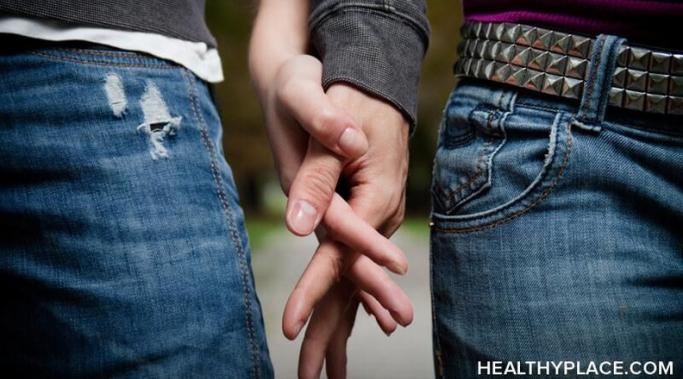Blogs
Those of you who follow me may have gleaned that I've been having trouble getting a psychiatrist. Basically, I was finally allowed to see one and she threw up her hands, told me to give up and that I was never going to get any better. This is one of the worst things I have ever been told, and personally, I think is unacceptable on pretty much every level.
However, yesterday I managed to see someone new, and this poses its own challenges.
You can learn to deal with phobias and fears. For example, I'm getting on a whole bunch of trains this week. That's something I couldn't do a couple of years ago. Public transport just wasn't my thing, and over time I developed a full-blown phobia of trains and other public transport.
Years ago I worked for a pharmacist who had obsessive-compulsive disorder (OCD). I only spent about 20 hours a month with him and didn't immediately notice the struggle he lived with every day. But by the time he was snatching prescriptions bottles out of my hand as I was ringing up customers, dumping the contents out, and counting the pills "just one more time," even I was having trouble coping with his obsessive-compulsive symptoms. After closing up the pharmacy one night, we said goodnight and he left. I took my time gathering my things from the back room and was headed for the door when I heard loud banging. Alarmed, I followed the sound and found him throwing his body repeatedly against the locked counter door, unable to trust that it was securely fastened. Watching him that night, I clearly saw the distress OCD can cause.
As I began discussing in last week's post, the challenges of parenting a child with a psychiatric illness aren't limited to just managing the illness. Like any other medical condition, psychiatric illness--even when under control--brings other issues to the party. Among them is homework. In this post, the "three-part-drama" of Homework continues.
Part II - The Battle Begins
A few weeks ago I wrote an article on the worst things to say to a person with a mental illness. This ended up becoming a very popular article. I think that’s because most of us have heard some or all of these dismissive things from people in our lives.
But a commenter posed an excellent question: What are the best things to say to someone with a mental illness?
People with a diagnosis of borderline personality disorder(BPD) often can not integrate more than one side of a situation. One week’s perfect therapy may be next week’s torture, rather than therapy being a helpful yet difficult process.
"Take a look inside my Bipolar Brain and you'll see crazy," proclaims Breaking Bipolar blog author, Natasha Tracy. Natasha is diagnosed with bipolar II, ultra-rapid cycling and has been in treatment for over a decade. Unfortunately, even after trying numerous bipolar treatments, Natasha has received little relief.
I was sitting in a group therapy session once when the leader succinctly described the perception those of us with multiple personalities have of ourselves as groups of entirely separate people by writing the following on the white board: Me/Not Me. This is me. That is not me. For instance, I am a writer. But if another member of my system were assigned the task of writing this blog post, we would see how the Multiple Personality Disorder label came about. Some might have done a passable job. Others would have struggled mightily only to ultimately produce a choppy, thoroughly unimpressive piece of work. I am me. They are not me.
Yesterday I talked about the Dissociative Identity Disorder diagnosis and the vital role clinicians play in making that diagnosis. One of the reasons it's important to talk to a therapist if you think you may have DID is that dissociation by nature impedes awareness. Most people can't see the spot between their shoulder blades without a mirror. Similarly, most severely dissociative people aren't able to clearly recognize the symptoms of DID and the extent of their problem without the help of a skilled clinician. In fact, the diagnosis often comes as a shock. Today I'd like to share with you a typical diagnosis story - my own.
Mental Illness: It's Not Just You
It's Mental Health Awareness Week and some of Hollywood's brightest stars have created a charity, and coming out campaign. Watch the PSA with the ever-sexy Harrison Ford: No Kidding, Me too!
Let's change the conversation about mental health, and treat anxiety. Here's a Friday fun one to help lighten your week:
The Obsessive-Compulsive Buddhist









I read this book many years ago, just as I was entering the turmoil of remembering, questioning and doubting myself all the way (as I'd been covertly taught over a lifetime). I happened to mention to my two sisters one day, "This is so strange but I've been diagnosed with PTSD." Both my sisters surprised me by responding, "Me too."
THEN I happened upon an old book manuscript that my now deceased father had written (not published), wherein the protagonist was obviously based upon himself and he rapes his "fiancee," who had my unusual name. Yes, truly.
Then I made myself look at the peculiar memory I always had where he violently threatened me but somehow I had never been able to recall what came before or after the episode. I had to admit that was a bit strange.
The pressures and powers to forget sexual abuse are great, both in family and society. In fact, I've come to the sad conclusion that the vast majority of survivors never really deal with their childhood wounds (a neglect for which there are always repercussions).
To critique an encouragement of people trusting their intuition in such matters is really getting the prescription dangerously wrong.
Thanks!